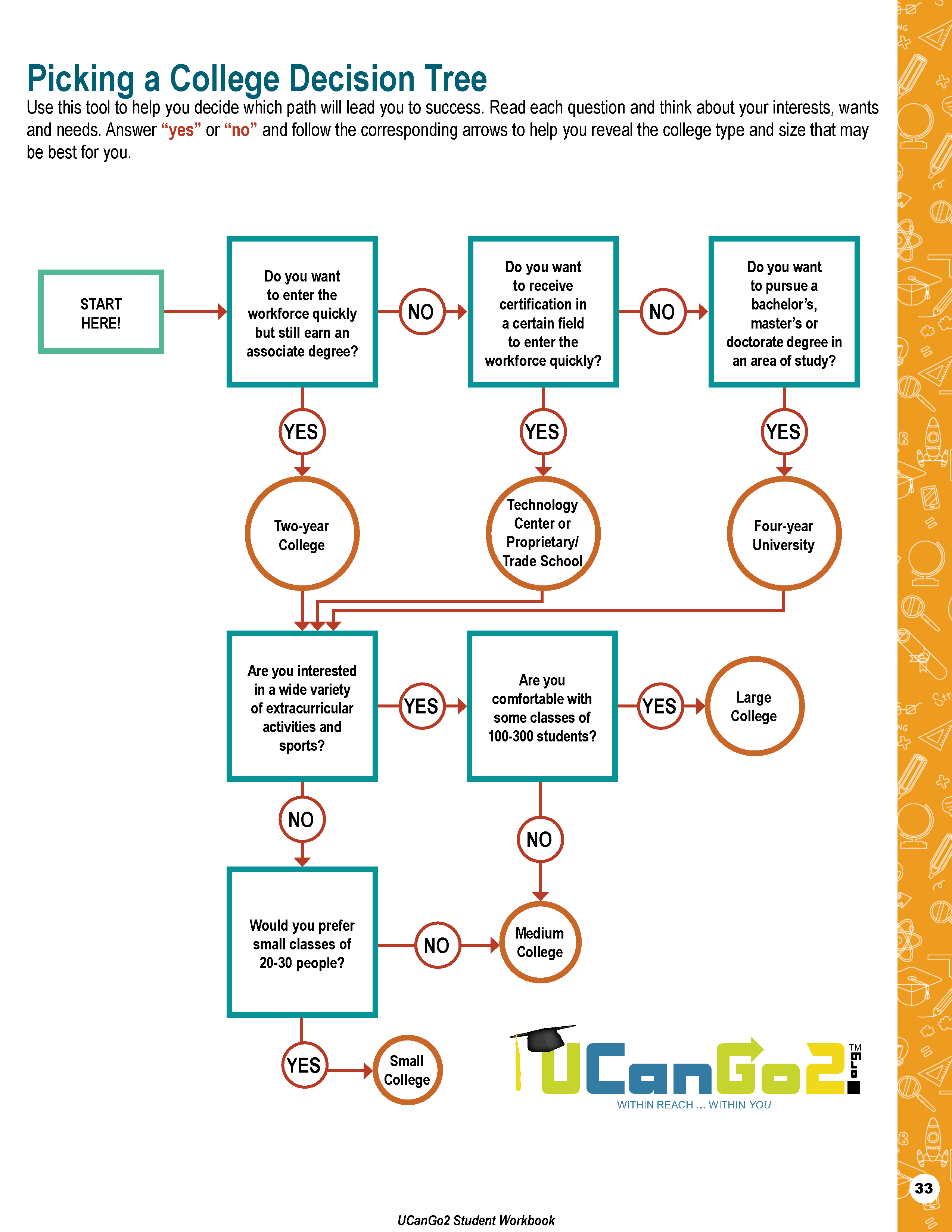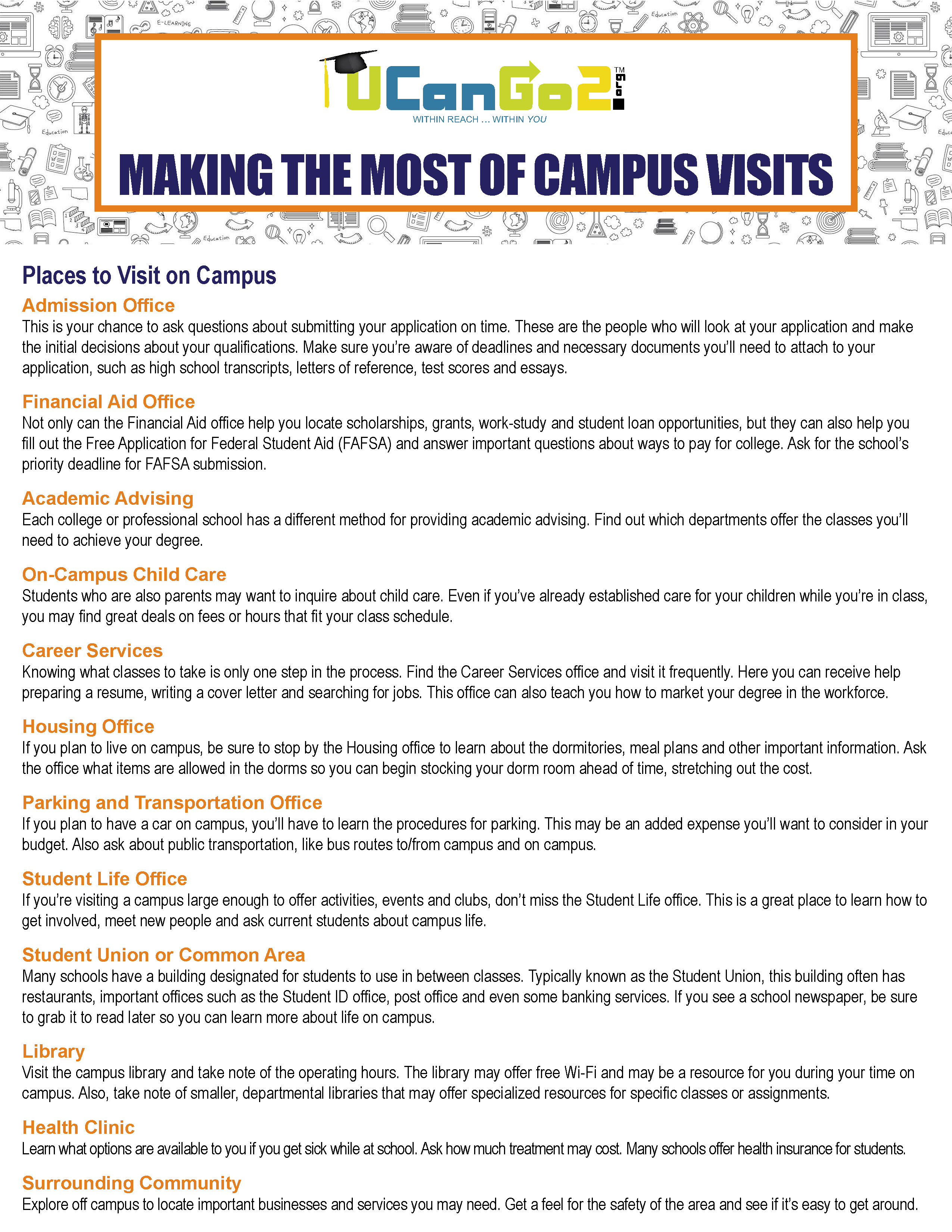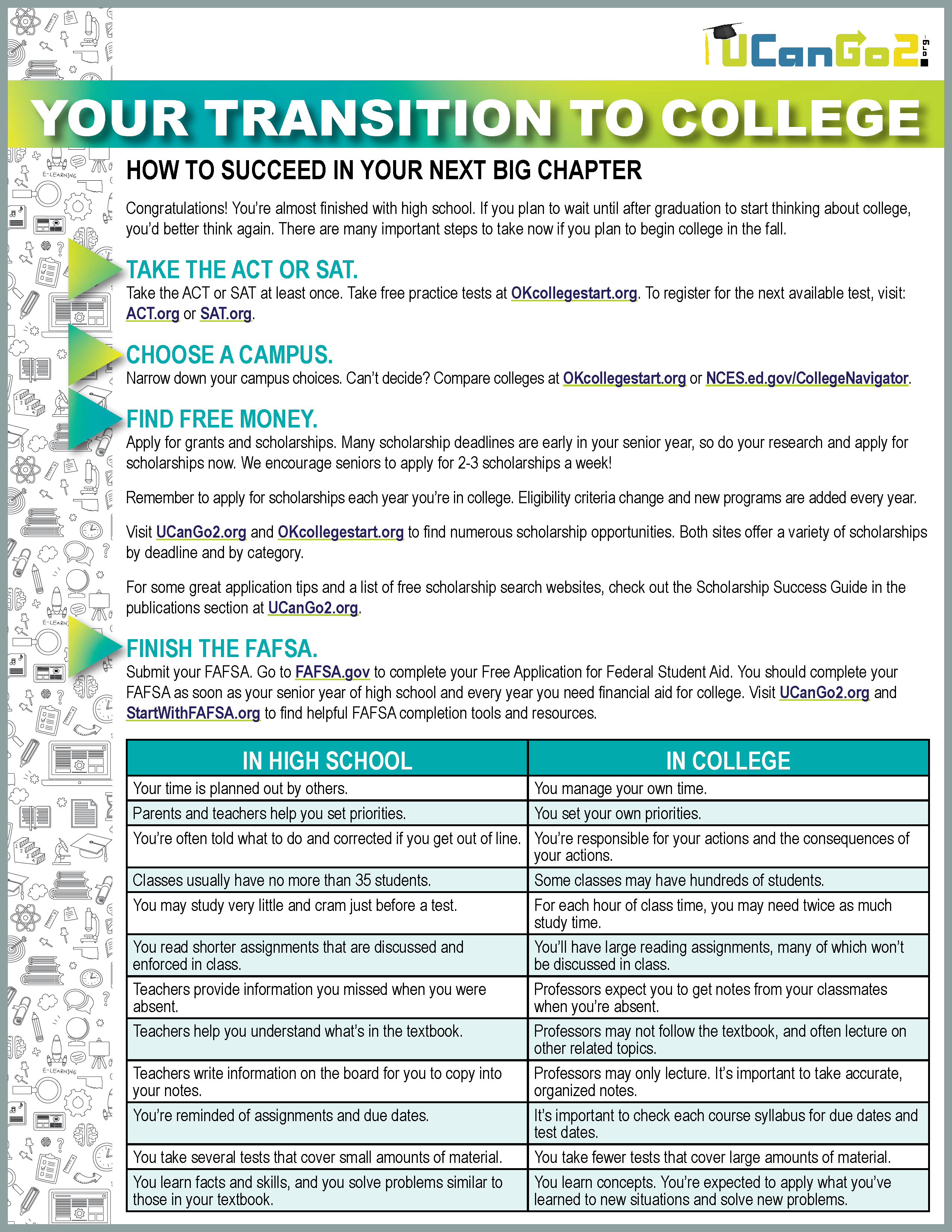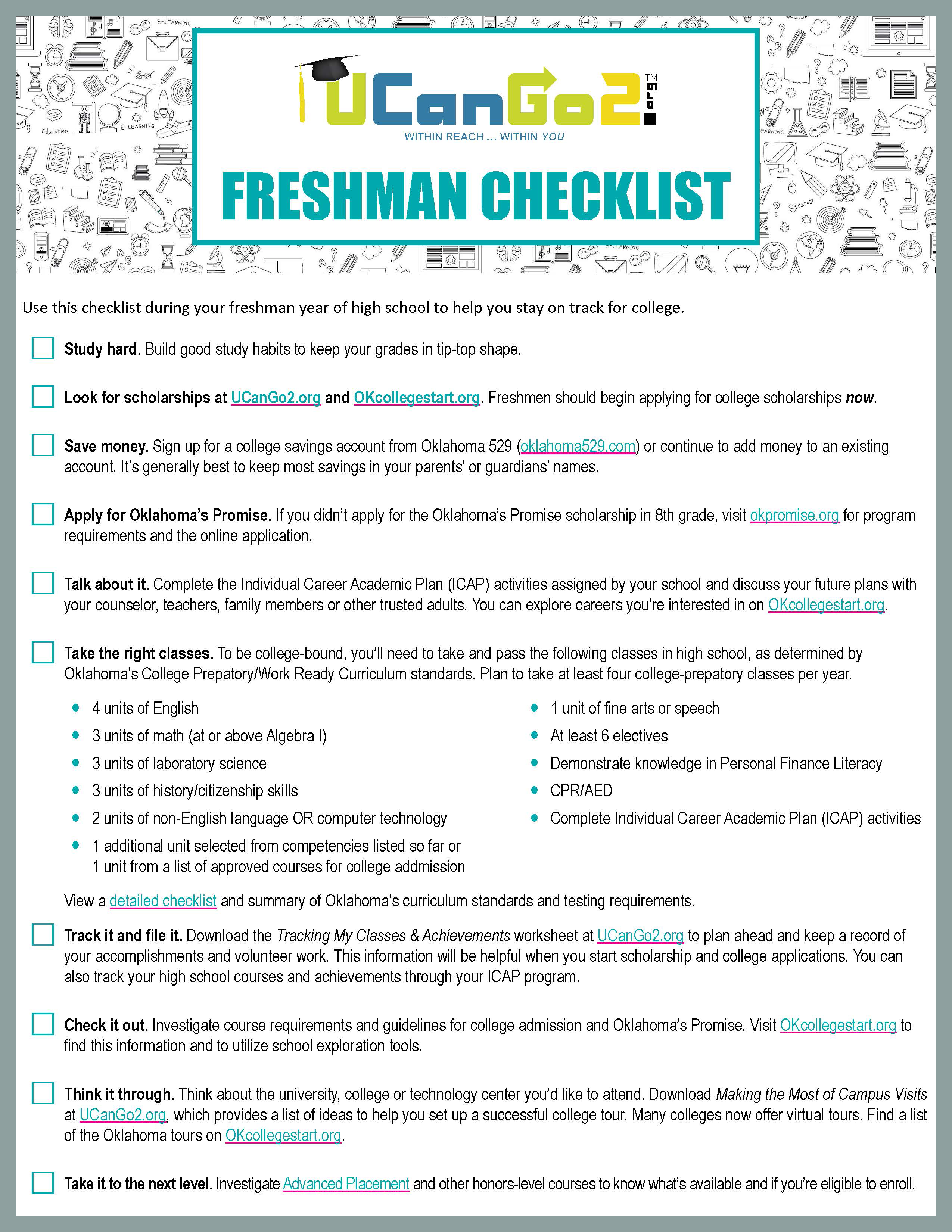Preparing for College in High School
Getting "College-Ready"
Once you've decided college is the right choice for you, you'll need to take steps to prepare yourself for college. The tabs below provide information to help you choose a school, stay on track to meet college admission requirements, and prepare yourself to do well in college. Use our Helpful Tools below to assist you along the way.
- Study Habits
- Classes to Take
- ACT/SAT
- Extracurricular Activities
- Choosing a College
- Admission Requirements
- Campus Visits
- Applying for College
- The Transition to College
Study Habits
Good study habits make for good grades. Good grades can help you get into a good college and increase your chances of winning scholarships to help pay for college. If you're having trouble keeping good grades, the study tips below can help. Make it a goal to raise your grades, and talk to your parents and school counselor to help execute a plan for improvement.
The Perfect 10 Study Habits
 Find a good place to study that's free of distractions and has good light.
Find a good place to study that's free of distractions and has good light.- Don't wait until the last minute.
- Study frequently, in shorter time periods. Four half-hour sessions are better than a two-hour session.
- Begin study time with your most challenging subject.
- Take a break when you find yourself losing focus.
- Organize every class using separate folders or binders for each.
- Get organized each night for the next day.
- Make the most of classroom time by listening, taking notes, and using free time for classwork or to study.
- Study with friends.
- Ask for help.
Next tab: "Classes to Take"
Classes to Take
If you plan to attend a public college or university in Oklahoma, you must take certain courses during high school. Not only are they required for college admission in Oklahoma, they will also help you prepare for the demands of college courses and teach you valuable skills for the workforce. For more information, visit sde.ok.gov.
If you want to get ahead of the crowd, consider your options for earning college credits while you're in high school.
Advanced Placement (AP) Courses
AP courses allow students to take college-level coursework in high school. Many Oklahoma colleges and universities award college credit to students who successfully complete these courses and pass the corresponding AP exams. Talk to your high school guidance counselor for more information about AP courses at your school.Concurrent Enrollment
This program allows high school juniors and seniors to take credit-earning college courses while still in high school. High school seniors who meet the eligibility requirements are entitled to receive tuition waivers for up to 18 credit hours and high school juniors can receive tuition waivers up to 9 credit hours, subject to available funding. Visit OKcollegestart.org to learn more.
Next tab: "ACT/SAT"
Previous tab: "Study Habits"
ACT/SAT
Most colleges in the United States require applicants to take exams used to measure educational achievements in a variety of subjects. Your overall score may be considered when you apply for admission to college.
The American College Testing (ACT) exam is more common in Oklahoma, but each college varies on entrance requirements. The Scholastic Aptitude Test (SAT) is commonly required for admission to many out-of-state colleges and universities.
Cost
Basic ACT or SAT exams typically cost $50-$70. Ask your school counselor about applying for a fee waiver.
Test Prep
It may be best to take the ACT and/or SAT more than once to help improve your score. Practice exams are available to help you prepare. Create an account at Visit OKcollegestart.org for various test prep tools. Talk to your school counselor about preparing for the exam and visit ACT.org or SAT.CollegeBoard.org to find test dates and locations.
Next tab: "Extracurricular Activities"
Previous tab: "Classes to Take"
Extracurricular Activities
Did you know that colleges and universities consider more than just grades and test scores on admission applications? They also look at your involvement in extracurricular activities. Outside of class, what activities do you enjoy? Do you play sports, volunteer or participate in church functions?
Think about how your involvement in extracurricular activities helps you build skills and/or give back to your community. If you don't participate in much outside of school and classes, what could you do to get more involved? If nothing comes to mind, here's a list of a few more activities to help you get ideas flowing:
- After school clubs or programs
- Community volunteering:
- Animal shelters
- Senior citizen centers
- Community centers
- Churches
- Blood banks
- Shelters
- Food banks
- Parks and Recreation Department
- Habitat for Humanity
- Crisis hotlines
- Part-time employment
- Tutoring
Next tab: "Choosing a College"
Previous tab: "ACT/SAT"
Choosing a College
College isn't one-size-fits-all. You'll need to do a little research to decide which college is the best fit for you academically, socially and financially.
Researching colleges isn't like researching your term paper. Of course, you'll want to gather the facts about cost of attendance, campus and class sizes, location, etc.; but don't rely on facts alone. Choosing a college or technical school is a personal and emotional decision, too. Explore colleges by region in Oklahoma. Use the Picking a College Decision Tree to help choose a school based on your unique preferences.
Location and Size

As you navigate the Picking a College Decision Tree, consider the size and location of the schools that interest you. Keep in mind that small schools give students the chance for more interaction with professors, smaller classrooms and more personalized assistance with educational needs. Larger schools provide more social opportunities and more classes to build a flexible schedule.
Urban Schools
Schools located in large metropolitan (urban) areas are usually surrounded by plenty of local events, museums and entertainment. The cost of living in such areas is often higher comparatively and near-campus parking can be a challenge. But, there are usually plenty of options for off-campus housing and opportunities for job placement and internships related to your field of study.Suburban Schools
Many schools are located in medium-sized towns (suburban) whose revenue often depends on the college. Typically called "college towns," these cities usually grow with the students' needs in mind. Things a college student needs, like laundromats, grocery stores and bookstores, are conveniently located near campus. Local events are often on-campus and off-campus housing may be located farther from the school.Rural Schools
Schools that serve rural populations are often located in areas strategically placed to serve a wide vicinity. Rural schools typically offer plenty of on-campus housing for those who don't wish to commute; off-campus housing may be harder to find. Student life is often focused on the campus, and local businesses may be spread farther throughout the town. Rural schools offer the chance for students from smaller areas to attend school without the expense of travel to a larger city or town, and the ability to stay close to family or friends.
Next tab: "Admission Requirements"
Previous tab: "Extracurricular Activities"
Admission Requirements and Cost
Schools consider your ACT and/or SAT score, high school grades, extracurricular activities and application essays during the admission process. By the time you're ready to narrow down your list of colleges you should have all of your important test scores. Compare your qualifications to the admission requirements and decide which schools are most likely to accept you. It's generally a good idea to make sure your list includes at least one school you're confident will grant you admission. While it's important to be realistic about your options, don't be afraid to take a chance. College admission is decided by real people who may be able to see beyond test scores. A great admission essay, dedication to volunteer work or extracurricular activities can make the difference.
We explore the cost of college and payment options extensively in the "Pay" section. It's important to consider college costs when choosing a college. College websites are required by law to provide an online tool that estimates educational expenses such as tuition and fees. This can help give you an idea of how much college will cost you and/or your family each year. Though college can cost both money and time, there are many options for financial aid to help you pay for school.
Next tab: "Campus Visits"
Previous tab: "Choosing a College"
Campus Visits
 Once you've narrowed down your school choices, you'll need to get a feel for the campus, the students and the surrounding area. The best way to do that is to arrange a campus visit. Talk to your high school counselor to see if your school offers campus visits or tours. Use the Making the Most of Campus Visits Guide to help you along the way.
Once you've narrowed down your school choices, you'll need to get a feel for the campus, the students and the surrounding area. The best way to do that is to arrange a campus visit. Talk to your high school counselor to see if your school offers campus visits or tours. Use the Making the Most of Campus Visits Guide to help you along the way.
The summer between your junior and senior year is a great time to tour campuses. Set aside some free time with your parent(s), guardians or other close friends or family. You'll need at least a full day for each college you're seriously considering. Remember to make travel arrangements, if necessary.
Before you arrive, make a few phone calls. Contact the school admissions office or welcome center to see what options are available to you. Most campuses offer a campus tour, but others may have more events and programs for potential students. Some campuses also offer virtual tours. Be sure to visit OKcollegestart.org for a list of current virtual tours. If you have an idea for your major, you should also contact the department that houses your major. That will help you start to learn about the program and its requirements.
Next tab: "Applying for College"
Previous tab: "Admission Requirements"
Make Your Choices and Apply
After visiting each college that interests you, you'll know which schools are worth the application fee and your time. Visit the schools' websites for information regarding the application process and get started on filling out forms, writing essays, gathering letters of recommendation and completing anything else required by each school.
Be sure to note important application and scholarship deadlines and call the admission office to make sure they received your paperwork. Also, confirm that your official test scores and transcripts will be sent to your selected colleges.
Next tab: "The Transition to College"
Previous tab: "Campus Visits"
The Transition to College
 The closer you get to graduating high school, the more you may start to wonder about what to expect in college. Not only are there several things you need to do to prepare for college, you should also be aware of the many ways that college is different from high school.
The closer you get to graduating high school, the more you may start to wonder about what to expect in college. Not only are there several things you need to do to prepare for college, you should also be aware of the many ways that college is different from high school.
For example, in high school your time spent in school is planned by others, and you're frequently reminded about upcoming due dates. In college you manage your own class schedule, and you're responsible for seeking out and meeting deadlines. In high school, most classes have no more than 35 students. In college, especially large colleges, some classes may have hundreds of students.
These are just a few of the differences between college and high school. To learn more about what to expect from college and how to succeed, check out our brochure, Your Transition to College.
Previous tab: "Applying for College"



